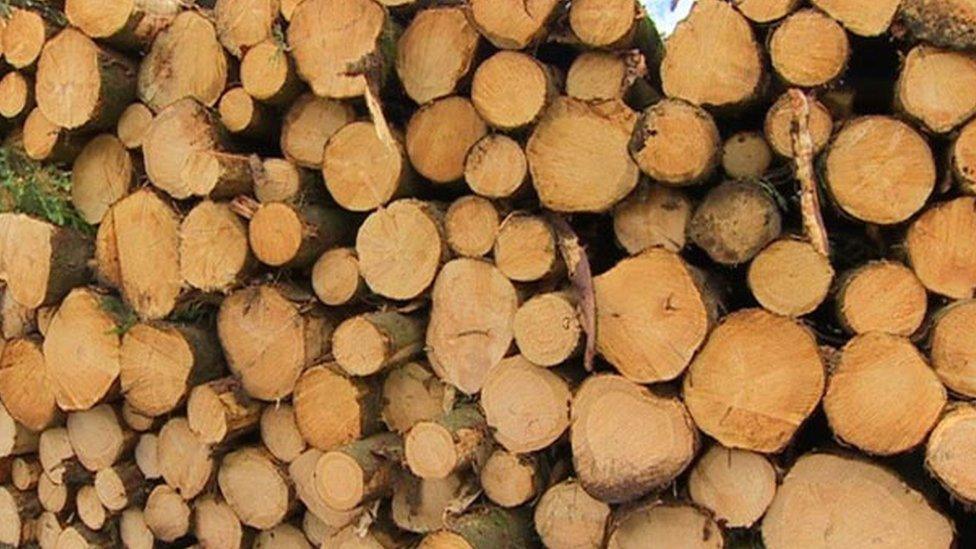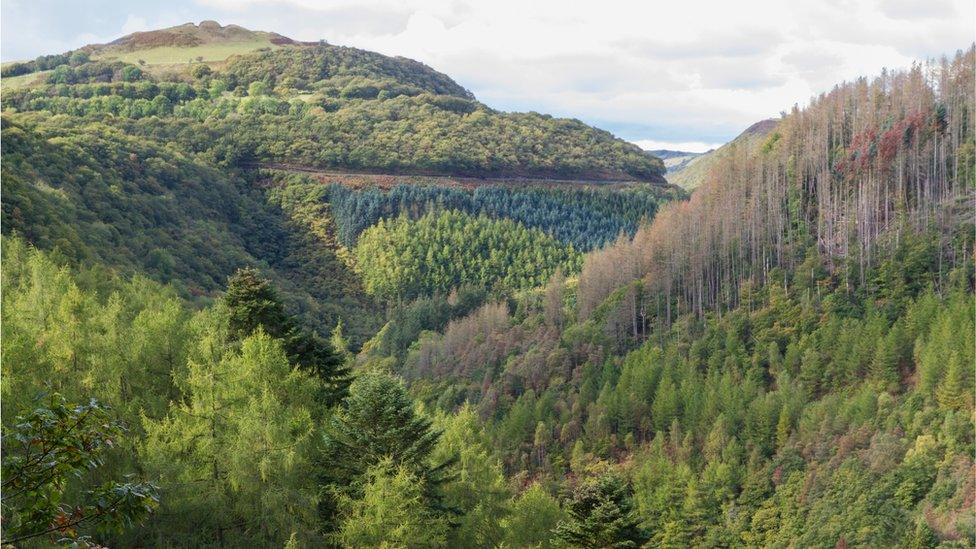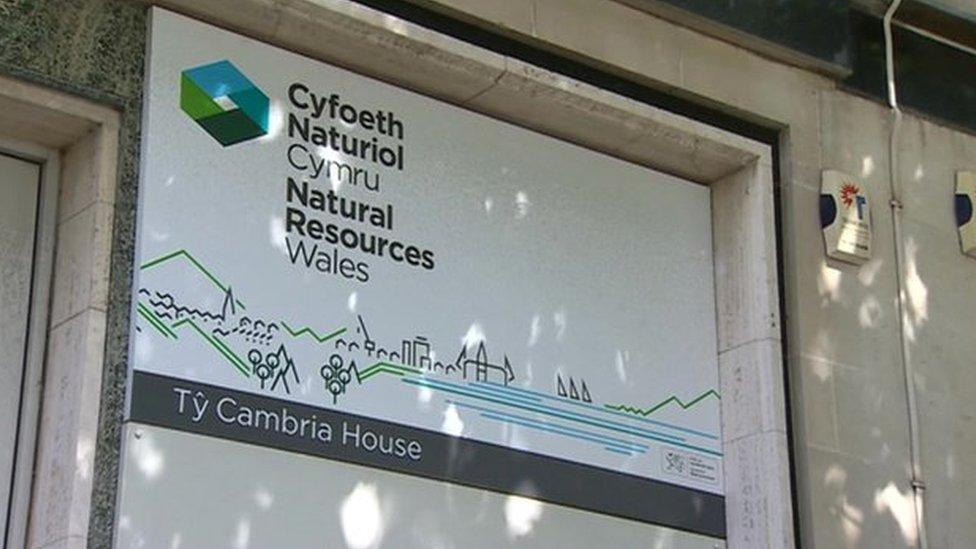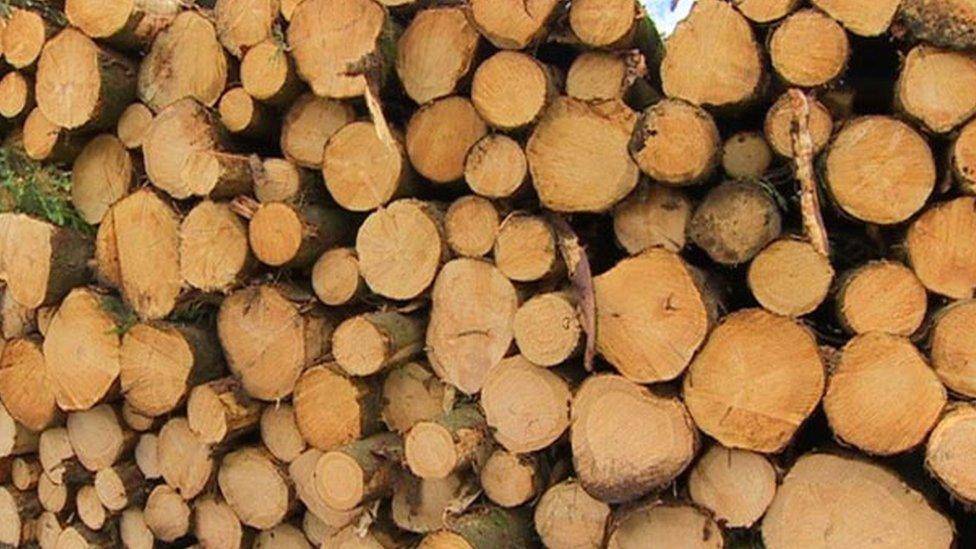'Serious concern' in industry over NRW timber deal
- Published

A controversial £39m Natural Resources Wales deal to sell timber to a sawmill that was not put out to tender has generated "serious concern" in the timber industry, it has been claimed.
David Sulman of the UK Forest Products Association criticised an apparent lack of "openness and transparency" in the deal.
The deal had been criticised by auditors.
NRW said the contracts were awarded in "extraordinary" circumstances.
In 2014 a company was awarded a series of contracts worth £39m to purchase both spruce and larch timber - the latter from forests where a fungus disease causing extensive damage, Phytophthora ramorum, was present.
The contracts were part of action NRW - which sells timber from publicly opened woodlands - took to deal with the disease, amid a rapid increase in its spread the previous year.

But a report by auditor general Huw Vaughan Thomas in March expressed doubt over whether the decision met state aid rules and said the decision-making process was not transparent.
Mr Thomas revealed that the deal was made without other companies being allowed to bid - but NRW disputed his findings.
The agreements were set to be pulled after the company failed to meet a key promise to build a new processing line for cutting timber.
Mr Sulman, who is executive director of the UK Forest Products Association which represents the domestic timber industry, said: "It's a very serious, disturbing and worrying situation for businesses across the forestry and forest public sector in Wales, and indeed further afield.
"Our principal concern here is that historically businesses who have dealt with Natural Resources Wales… have always been assured that dealings with NRW would be fair, open and transparent.
"In this case, from what we can see there appears to have been a considerable lack of fairness, openness and transparency, and that is really what is giving rise to such serious concern across the sector at the moment."
"There probably are businesses out there who feel they were denied opportunities," he said.
Fears that the market for larch was on the brink of collapse at the time of the deal have been given as one of the reasons why NRW went ahead with the deal - but whether this was the case has been questioned by Mr Sulman.

Natural Resources Wales' chief executive said he is confident the evidence NRW has given is "valid"
Evidence, external given by chief executive Emyr Roberts at a meeting of the assembly's public accounts committee in March said that, at the time of the deal: "We had a real crisis on our hands."
"There was a danger of the timber market collapsing at that time," he said.
But Mr Sulman said the statement was "wildly inaccurate" and "misleading".
"Events have proved, in the intervening period through 2014 through today, that the diseased larch that was harvested has been equally well processed and sold in the market place," he said.
He said a full investigation by the public accounts committee was "probably warranted given the seriousness of the situation".
David Sulman told the Assembly's Public Accounts Committee there was an "extremely worrying" loss of expertise.
Mr Sulman gave evidence to the assembly's public accounts committee on Monday, while the NRW was also re-called to answer questions.
He told AMs that NRW it was in danger of "squandering the legacy" of Forestry Commission Wales, after the merged environmental organisation took over its functions in 2013.
Mr Sulman said there was an "extremely worrying" loss of expertise.
NRW chief executive Emyr Roberts was asked three times what impression he felt the fall-out of the controversial timber deal had given of his organisation.
"I'm happy to justify the decision we took but with hindsight we would have handled things differently," he told the committee.
Mr Roberts said the organisation was facing a challenging situation at the time but agreed it "should have tested the market more thoroughly".
He strongly refuted that forestry was treated as "a poor relation".
"We attach a high priority to forestry and to developing relationships with our customers."
He said he was disappointed and "baffled" by Mr Sulman's comments and would be happy to meet with him to discuss further.
In an earlier statement, Mr Roberts said the long-term contracts were awarded at a time when the NRW was dealing with "an extraordinary set of circumstances".
He added: "Our prime objective at the time was to secure a market for the diseased larch and we succeeded in doing so following our agreed processes.
"We are confident that the evidence we gave to the previous public accounts committee was accurate and valid."
Neither NRW or the Wales Audit Office have revealed the name of the firm that was awarded the contracts.
- Published28 March 2017

- Published15 March 2017

- Published4 April 2017
